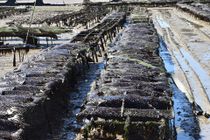Ostroveganism or Bivalveganism
Ostroveganism, also often called bivalveganism (supposedly including a broader set of bivalves, some of which are motile), is veganism plus the consumption of these simple brainless animals with only primitive ganglia on the presumption that they are not sentient. The Philosophical Vegan community doesn't endorse or condemn the practice.
"I don't think that bivalves — mussels and clams — I don't think they can suffer, so I eat them." -Peter Singer
Contents
Probability of Sentience
Unlike plants or sponges which we can be certain of the non-sentient status, bivalves possess nerves and ganglia (like primitive brains), so in theory may be able to process information. It is unclear if the small ganglia in any of these brainless animals is adequate to support even marginal sentience. We have no evidence of their sentience (which would be found by tests of true learning like operant conditioning), but neither does it appear that anybody has tried extensively to gather such evidence (as has been done with insects). Contrary to the popular claim, absence of evidence is actually evidence of absence -- but only when a thing has been extensively investigated.
Beyond physiology and direct evidence, we can surmise for evolutionary reasons that oysters specifically are probably not sentient; as they are sessile, sentience would be unlikely to pose a significant evolutionary advantage compared to the resources it would require. There would be no reason for them to evolve it, and every reason to lose it. Some sessile animals (sea squirts) even "digest" (absorb) their own brains once their larvae find a suitable place to attach, because the complex nervous system required for locomotion is no longer useful. It is very reasonable to expect an animal like this to have the minimal amount of sentience which is useful to its environment, and that appears to be none.
Other motile bivalves may be more likely to be sentient, because an understanding of environment and threats is more useful to motility. Evolutionary evidence and resource efficiency can't speak as confidently to the non-sentience of these bivalves.
Precautionary Principle
Is not eating oysters because they are possibly sentient an appeal to ignorance fallacy?
A typical example of an appeal to ignorance fallacy is: "We don't know X about the universe, therefore god exists and is responsible" It's a jump from an unknown to a known.
Appealing to ignorance in itself as a reason to do or not do something without making any knowledge claims that are supposed to deductively follow it isn't an appeal to ignorance fallacy. In situations where something is unknown it is not unreasonable to err on the side of avoiding an action that might cause harm -- this is the basis of the precautionary principle. That is, if the alternative doesn't come with those issues. Oysters are more complicated, because the harm benefit assessment within the bounds of our knowns and unknowns giving them the greatest benefit of the doubt may not justify the precautionary principle.
Common arguments in favor of eating oysters are:
- If they are sentient, they are barely sentient so the harm risk if very low and must be weighed against benefits
- The harm may be less than that per gram of protein than vegan land agriculture because rope grown oyster harvesting is to environmentally benign or even beneficial
- Consumption of oysters may help certain people stay otherwise vegan, thus preventing consumption of animals we know to be highly sentient and who suffer through farming.
The points regarding the benefits of oysters and harms of land agriculture are not clear or uncontroversial enough that reasonable people can't disagree on them, these will be discussed later in this article. The point about consuming oysters to stay vegan is less controversial, and generally speaking, vegans agree that anybody should do their best and that eating lower animals like this who are less probably sentient is better than the alternative -- if the alternative it eating cows, pigs, chickens, fish, etc. Whether that makes it close enough to veganism is more controversial.
Does the burden of proof rest with someone claiming oysters are not sentient, or with somebody claiming they are?
The burden of proof remains unchanged, the precautionary principle merely speaks to action when we don't have proof; it's the idea that we are reckless to act in ways that may harm when something is unknown.
All in all, even with the possible ethical arguments to be made against oysters, given the lack of strong evidence for their sentience, it should not be something Vegans focus much of their time on; We should be focusing on things that are definitely harmful, which is the cruelty of animals that unquestionably do have sentience. Similar to focusing too much on honey, making a huge deal about oysters can possibly put off people from Veganism, which ultimately hurts more animals.
Possible environmental benefits
Unlike every other animal product that is extensively farmed, there is a possible contention that at least rope-grown oysters are harmless to or possibly beneficial for the environment.While wild-caught oysters are still harmful for the environment in the same way fishing is, growing oysters via ropes is actually a fairly sustainable technique. Put very simply, farmers take advantage of the environments in which oysters grow, and use two parent oysters to create the larvae, which are then used to grow the oysters.
This does not require the immense amount of land and feed that is needed to farm land animals, and it doesn't contribute to the overfishing of oceans, making the environmental impact fairly small, and comparable to most plant foods. In terms of positive environmental benefits, growing oysters can help filter water (removing sediments and phytoplankton) to make it cleaner, and possibly remove greenhouse gas emissions since the growing of the oyster shell requires cultivating atmospheric carbon dioxide.
Health
In terms of health, oysters are probably the healthiest animal product available, though they still remain as a source of dietary cholesterol.
